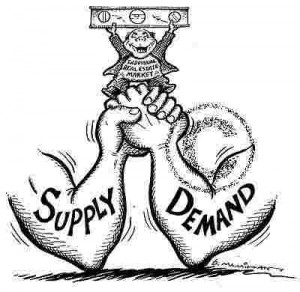We all know housing is tough, right now. Media sources abound with new lows in construction, mortgage filings and existing-home sales. New data from JPMorgan Chase, though, as pinpointed by Investment News’ Jeff Benjamin, suggests that pent-up demand from potential homebuyers could be the catalyst in a housing recovery.
It’s a matter of prices and housing starts, Benjamin writes. According to Chase, nominal home prices are down 29 percent from 2005, and since 2009, annual housing starts have averaged just 575,000 (the average rate from 1959 to 2008 was 1.5 million). Low prices and a shortage of new homes contribute to a serious demand for existing-homes, even if it’s resting in the shadows.
According to David Kelly, the chief market strategist of J.P. Morgan Funds, the market conditions are ideal for buying, and even the smallest investment could stimulate more buyers to jump into the fold.
“It’s a great time to buy and invest in housing, and as housing comes back, it will give a great boost to the economy,” Kelly said in Benjamin’s piece, emphasizing the virtuous cycle that could move rather quickly once it starts gaining momentum. “At these levels, we don’t need a lot of people to buy into it initially; we just need a few to get it started.”
“It’s similar to what is already happening in the auto industry, where nobody really feels good about it, but people are buying cars because of pent-up demand,” he added.
Bert Whitehead, president of Cambridge Connection Inc., said that though buyers may need to dig through foreclosures and other REOs, the numbers make too much sense to ignore buying a house.
“We’re advising clients to take another look at real estate,” he said.
Typically, Whitehead recommends a simple formula to decide whether renting or buying it the better strategy: buyers should compare the annual cost of paying rent with 4 percent of a property’s selling price.
“For example, if you can rent a $250,000 home for less than $10,000 a year, it is a better value to rent,” Benjamin writes.
With housing markets differing from city to city, however, that is not always the case, especially with home values at such an affordable level. As we covered in October, homes are so affordable that renting is more expensive than owning in some metropolitan areas – a fact that only contributes to greater demand for housing and, we hope, a healthy recovery.

